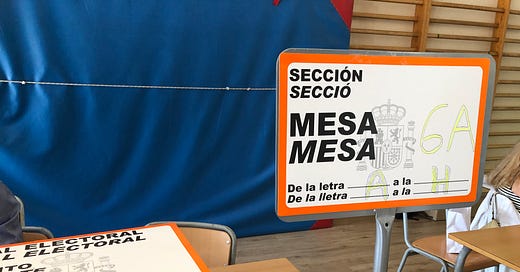‘Twenty-four hours is a long time in politics,’ someone reminded me this morning, but I would personally cut that by another 12 hours for politics in Spain. This newsletter is normally sent out on Sunday evenings, but I’d waited until Monday morning in order to mention the final results of the local and regional elections held yesterday. Just a few hours later, however, Prime Minister Pedro Sánchez made a surprise announcement, telling us that there’s now going to be a General Election held on Sunday 23 July, just eight weeks away, and almost seven months earlier than we’d expected.
I voted in Spain for the first time yesterday, at the Escola Maria Ossó in Sitges, my hometown. Being a British resident here in Spain, I’m allowed to vote in municipal elections, but not regional, and not on 23 July (but we’ll come to that).
Before Sunday’s elections, Sánchez - who leads the PSOE socialists, currently in power nationally in a coalition with Podemos - had said he hoped citizens would ‘vote positively’. Meanwhile, Alberto Núñez Feijóo, the leader of the main right-wing opposition party, the PP, said he hoped people would ‘vote massively’. I don’t know if my vote was massive or not, but as I’m an optimist, it was definitely positive.
It seems that the results of the local elections in my hometown, and also the results from the nearest, largest city of Barcelona, bear no resemblance at all to what’s going on across the rest of Spain.
In Sitges, the Junts de Sitges party received the most votes, with the Catalan Socialists (PSC) maintaining their quota of councillors, although it’s not yet clear who will end up being the mayor (they’ll need to work it out by 17 June, which is the ‘swearing-in’ day, apparently). A similar result took place in Barcelona, where former mayor Xavier Trias (with his Trias per Barcelona party backed by Junts per Catalunya) won the most seats (11), but with the PSC in a strong second position with 10 seats. Again, it’s not yet clear who will become mayor, although it’s pretty obvious that Ada Colau, who came third, won’t be enjoying a third term.
Across the rest of Spain, however, the socialists have done diabolically in the local and regional elections. Before Sunday’s vote, 10 of the 12 regions (where new leaders were to be elected) had been run by the socialists, either alone or in coalition. With over 95% of the vote counted, only three of the 12 regions will remain governed by the socialists. In Madrid, the PP won absolute majorities at city and regional level, and they’ve also won in Valencia, Seville, Palma de Mallorca, as well as the regions of Aragón, Cantabria, La Rioja, Extremadura, the Valencia Community and the Balearic Islands. Other than in Madrid, however, the PP are going to have to govern with the support of the far-right Vox group … which brings us back to the General Election.
Why has Sánchez suddenly announced an election for 23 July? I think he’s going ‘all in’ with a gamble, although it’s a huge risk for him. He’s giving the PP no time to celebrate their local and regional victories, and by announcing the election in eight weeks time he’s also ordering his coalition partner, Podemos, to get their act together, with or without the new Sumar platform of his deputy PM, Yolanda Díaz. I think he’s also turning to the national electorate, and as good as asking for a vote of confidence. He’s saying ‘this is what’s going to happen on a national level - you’re going to get the PP with Vox if you don’t vote for me’. He’s gambled in the past and miraculously it’s paid off. But he might be in for a shock on 23 July.
One thing is certain for now: the current Spanish parliament will be dissolved this week and we’re going to have eight weeks of bickering and ‘campaigning’, without anything actually getting done in Spain until after 23 July. Which will then become from the start of September, because everything closes down in August …
The Barcelona Connection - research & dates for diary
From next week, I am also going to start writing more here about the research that I carried out for The Barcelona Connection, seeing as I had to recently write something on it for The Art Newspaper. Reviews so far have also been praising the ‘impeccable research into Dali’s work and the workings of international police’ … with ‘the action betraying a detailed knowledge of and affection for his adopted city of Barcelona and Catalonia’ … Have you read the book yet? Click here to choose where to order it from!
Don’t forget these dates for your diary if you are in Barcelona or Madrid:
On Thursday 29 June at 7pm, I’m going to be doing an official presentation of the book in the company of the British Consul in Catalonia, Lloyd Milen, MBE. The event is taking place at the Alibri bookshop on the Carrer de Balmes, 26 - and it would be wonderful to see you there. Further info can be found here: https://www.alibri.es/events/2119.
It is now also confirmed that I will be doing an event at The Secret Kingdoms bookstore in Madrid on Thursday 28 September. More details on that in due course.




